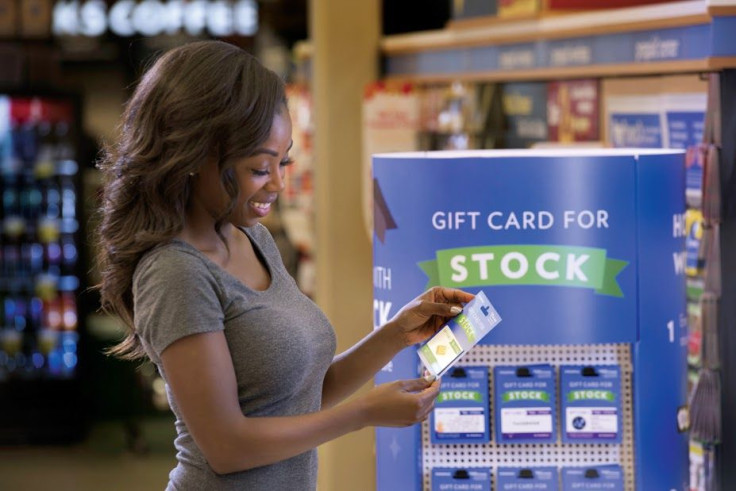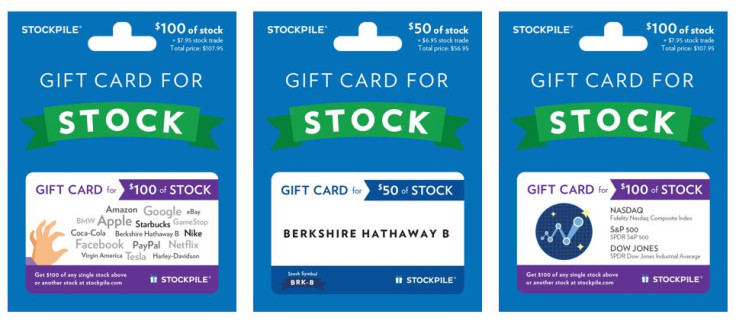Stockpile's Stock Gift Cards Go National, Available Nationally In Toys R Us, Safeway, Kmart, Others

Next time you’re at Kmart, Office Depot or Toys R Us and you get a hankering to buy some Google stock, just head toward the checkout aisle. Just six months after the brokerage firm Stockpile put partial shares of blue chip stocks and index funds on shelves in several dozen stores, the firm’s gearing up to go national. A number of national retailers, including Kmart, Toys R Us, Safeway and Wegman’s are all about to start selling the company’s gift cards all over the country.
“There’s a lot of pent-up demand in this country to own stock,” said Dan Schatt, Stockpile’s chief commercial officer. “Every retailer that dipped their toe in the water with a few stores has decided to go national.”
At its most basic level, the privately held company is no different from any other digital brokerage firm: It is in the business of helping consumers buy and sell stocks. What’s different is the form: small blue gift cards available in super markets, big box retailers and other chains.

Once consumers have set up accounts, they can buy, sell and trade their shares like they might with any other brokerage firm. But unlike most other brokerages, Stockpile’s fees are lighter than most traditional brokerages. Stock trades cost just 99 cents, there are no minimum balances or monthly fees, and it costs nothing to transfer money in from other accounts.
The brokerage and its gift cards, which Stockpile spent nearly three years clearing with the Financial Industry Regulatory Authority and the Securities and Exchange Commission, represent a novel approach to a long-standing problem. Just 14 percent of American adults directly own stock, and many of them are intimidated by the prospect of having to choose a broker, amass the money necessary to maintain a minimum balance or even pay into accounts they already have.
Yet consumers are comfortable with gift cards. Schatt says a full 90 percent of them have used one at some point or another, and they’re familiar with the concept of how they’re supposed to work: You get a set amount of money that can be used to buy anything at a certain kind of store.
That’s exactly how Stockpile cards work, but in this case, the store is the U.S. stock market. If someone gets a Stockpile card for $100 worth of Google stock — about 14 percent of one share, based on where the stock’s price closed Friday — the $100 easily can be used in some other way. “If you have Google stock, and you don’t want it, you can transfer it to Amazon [stock],” Schatt said.
In the first few months after roll-out, Stockpile’s most enthusiastic customers were older Americans looking to get younger relatives into the habit of investing — “People over 30 giving to people under 30,” as Schatt put it — and that’s served the company well; a full third of Stockpile’s user base is under the age of 25.
But where Schatt and his colleagues see potential for further growth is at an institutional level, where loyalty cards or employers rewarding their employees with gift cards, are quickly taking root. A survey conducted by loyalty marketing services firm Colloquy found the average American household is currently participating in more than 21 loyalty rewards programs, and Schatt sees stock as a huge potential ingredient in that mix.
“For some very large companies that have tens or hundreds of thousands of employees, some of whom are not eligible for stock options or having a 401(k), now it’s as easy as giving them a gift card,” Schatt said.
Schatt says the company has already fielded requests from company managers looking to provide shares to their employees as a way to thank them for hard work on projects, or for exceeding sales or productivity targets. Moving further down the line, it’s possible that you could wind up getting a small share of GM stock the next time you test drive one of their cars. Buying, or receiving some small share of a company’s future can have all kinds of positive effects on that company’s relationship with its consumers.“That really reinforces loyalty,” Schatt said.
As Stockpile expands across the U.S. retail landscape in the next several months, Schatt stressed he doesn’t see his company’s goal as getting everybody to play the market. “Our mission is not to pull people in,” he said. Instead, he sees Stockpile as a tool that can maybe get people more engaged with their money, and thinking more proactively about getting it to work for them. “All of this, hopefully, will culminate in making a dent in this country’s savings rate,” he said.
source: tradingeconomics.com
© Copyright IBTimes 2025. All rights reserved.





















